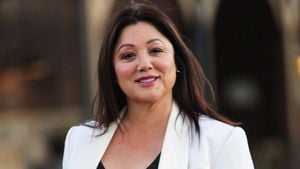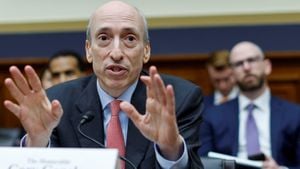President-elect Donald Trump has made headlines once again with his recent announcement of Scott Bessent as his choice for Treasury Secretary. A billionaire hedge fund manager, Bessent is no stranger to the world of finance and politics and is expected to lead the economic agenda for the incoming administration.
At 62 years old, Bessent is the founder of Key Square Capital Management and has extensive experience on Wall Street, having worked for major firms like Soros Fund Management and Brown Brothers Harriman. He is well-regarded within financial circles and has been closely associated with Trump, contributing significantly to his campaign.
“Scott is widely respected as one of the world’s foremost international investors and geopolitical and economic strategists,” Trump said when making the announcement, underscoring the importance of Bessent’s role as he looks to implement his vision for the U.S. economy. With his background and previous experience advising Trump, expectations are high for Bessent to help advance policies aimed at cutting taxes and instigates tariffs, particularly targeting China.
The nomination of Bessent was met with approval from various sectors, seen as someone who can balance traditional fiscal responsibility with the aggressive economic policies Trump has pitched. Bessent's task will include overseeing tax policy, managing public debt, and guiding international finance matters, making his position one of significant influence at this pivotal time for the U.S. economy.
Interestingly, Bessent's association with billionaire investor George Soros raised some eyebrows. During his tenure with Soros Fund Management from 1991 to 2000, Bessent was involved with influential financial decisions, including the notable “Black Wednesday” event of 1992. This connection might present challenges, especially considering Trump’s frequent critiques of Soros and his political affiliations.
Despite these potential hurdles, Bessent's financial prowess and innovative economic outlook are expected to resonate with Trump’s supporters. He has articulated views championing the revival of American manufacturing, enhancing domestic energy production, and reducing governmental subsidies, focusing on fiscal discipline. During public appearances, Bessent has consistently backed the idea of aggressive tariffs as tools for economic policy, asserting their role as equalizers against unfair trade practices.
Trump’s decision to name Bessent, alongside the appointments of other key figures like Russell Vought for the Office of Management and Budget and Dr. Janette Nesheiwat as surgeon general, showcases his commitment to creating a cabinet filled with individuals who align with his vision for the nation.
Soon after Trump's announcement, notable figures from various sectors reacted. Elon Musk, originally supportive of Bessent, expressed skepticism, calling for more dynamic leadership. Musk's shift reflects the divisive atmosphere surrounding Trump’s transition and indicates there may be differing opinions within Trump’s circle on the right approach for the administration.
Supporting Bessent’s nomination is the expectation among economists for his moderate stance. Seen as a centrist by many, he holds the potential to secure bipartisan support, contrasting with the hardline approaches of some Trump allies. That balance could be exactly what’s needed as the country looks to navigate complex fiscal challenges, acknowledging both the timelines of past expenditures and the ambitious goals for economic recovery.
Among these ambitions are continuing tax cuts passed during Trump’s first term, which will start to expire soon, increasing pressure on Bessent to bolster those policies without exacerbaying the national debt, which currently stands around $36 trillion. During the aftermath of the pandemic, managing this debt level remains top of mind for many citizens and lawmakers, making the Treasury Secretary’s role uniquely significant.
Bessent's anticipated tenure will not only involve managing tax policy but will also intersect with broader economic strategies meant to reinforce U.S. competitiveness on the global stage. The recent market reactions reflect optimism around Trump's agenda, advocating for enhanced private-sector engagement as he aims to optimize governmental frameworks for economic growth.
The broader economic agenda laid out by Trump and endorsed by Bessent includes deregulation, heightened energy independence, and measures to reinvigorate manufacturing sectors. Together, they are portraying these initiatives as part of efforts to lift Americans out of economic hardships and create pathways for sustainable growth.
Bessent's experience and close ties to Trump through multiple economic advisory roles have placed him firmly on track to spearhead the administration's fiscal strategy. His perspectives on issues like inflation, economic volatility, and resurgence from the pandemic's impact are expected to align closely with Trump's vision.
While the Senate holds the final say over Bessent's confirmation, his background and associations will likely catalyze both support and opposition. Observers note the significance of appointing someone with Bessent's expertise, particularly at this moment when the U.S. is grappling with rising costs, the need for job creation, and challenges within international trade.
For Trump, Bessent’s nomination signals continuity alongside change, aiming to blend his hardline economic policies with expertise from the finance industry. He remains optimistic about this selection, stating it will “usher in a new Golden Age for the United States” by reinforcing the country’s financial health and ensuring sustainable growth.



